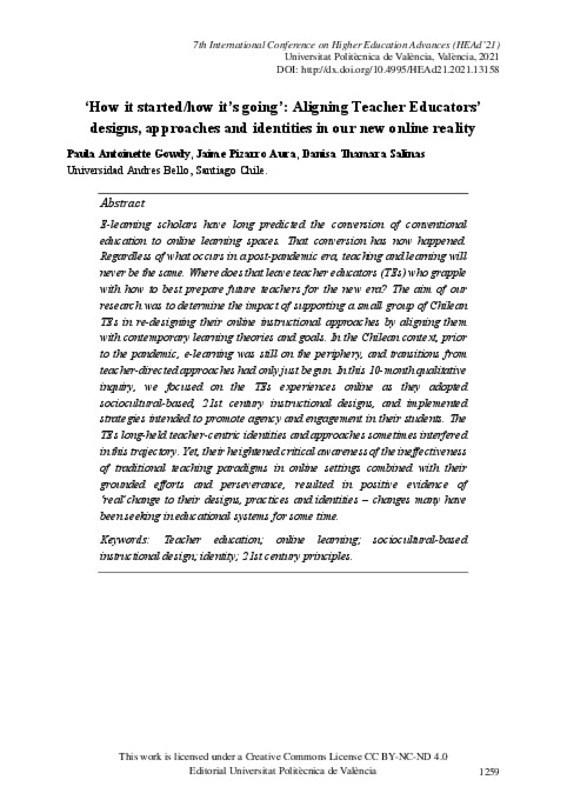JavaScript is disabled for your browser. Some features of this site may not work without it.
Buscar en RiuNet
Listar
Mi cuenta
Estadísticas
Ayuda RiuNet
Admin. UPV
How it started/ how it’s going’: Aligning Teacher Educators’ designs, approaches and identities in our new online reality
Mostrar el registro sencillo del ítem
Ficheros en el ítem
| dc.contributor.author | Gowdy, Paula
|
es_ES |
| dc.contributor.author | Aura, Jaime
|
es_ES |
| dc.contributor.author | Salinas, Danisa
|
es_ES |
| dc.date.accessioned | 2021-09-21T06:54:38Z | |
| dc.date.available | 2021-09-21T06:54:38Z | |
| dc.date.issued | 2021-07-26 | |
| dc.identifier.isbn | 9788490489758 | |
| dc.identifier.issn | 2603-5871 | |
| dc.identifier.uri | http://hdl.handle.net/10251/172879 | |
| dc.description.abstract | [EN] E-learning scholars have long predicted the conversion of conventional education to online learning spaces. That conversion has now happened. Regardless of what occurs in a post-pandemic era, teaching and learning will never be the same. Where does that leave teacher educators (TEs) who grapple with how to best prepare future teachers for the new era? The aim of our research was to determine the impact of supporting a small group of Chilean TEs in re-designing their online instructional approaches by aligning them with contemporary learning theories and goals. In the Chilean context, prior to the pandemic, e-learning was still on the periphery, and transitions from teacher-directed approaches had only just begun. In this 10-month qualitative inquiry, we focused on the TEs experiences online as they adopted sociocultural-based, 21st century instructional designs, and implemented strategies intended to promote agency and engagement in their students. The TEs long-held teacher-centric identities and approaches sometimes interfered in this trajectory. Yet, their heightened critical awareness of the ineffectiveness of traditional teaching paradigms in online settings combined with their grounded efforts and perseverance, resulted in positive evidence of ‘real’change to their designs, practices and identities – changes many have been seeking in educational systems for some time. | es_ES |
| dc.format.extent | 8 | es_ES |
| dc.language | Inglés | es_ES |
| dc.publisher | Editorial Universitat Politècnica de València | es_ES |
| dc.relation.ispartof | 7th International Conference on Higher Education Advances (HEAd'21) | |
| dc.rights | Reconocimiento - No comercial - Sin obra derivada (by-nc-nd) | es_ES |
| dc.subject | Higher Education | es_ES |
| dc.subject | Learning | es_ES |
| dc.subject | Educational systems | es_ES |
| dc.subject | Teaching | es_ES |
| dc.subject | Teacher education | es_ES |
| dc.subject | Online learning | es_ES |
| dc.subject | Sociocultural-based instructional design | es_ES |
| dc.subject | Identity | es_ES |
| dc.subject | 21st century principles | es_ES |
| dc.title | How it started/ how it’s going’: Aligning Teacher Educators’ designs, approaches and identities in our new online reality | es_ES |
| dc.type | Capítulo de libro | es_ES |
| dc.type | Comunicación en congreso | es_ES |
| dc.identifier.doi | 10.4995/HEAd21.2021.13158 | |
| dc.rights.accessRights | Abierto | es_ES |
| dc.description.bibliographicCitation | Gowdy, P.; Aura, J.; Salinas, D. (2021). How it started/ how it’s going’: Aligning Teacher Educators’ designs, approaches and identities in our new online reality. En 7th International Conference on Higher Education Advances (HEAd'21). Editorial Universitat Politècnica de València. 1259-1266. https://doi.org/10.4995/HEAd21.2021.13158 | es_ES |
| dc.description.accrualMethod | OCS | es_ES |
| dc.relation.conferencename | Seventh International Conference on Higher Education Advances | es_ES |
| dc.relation.conferencedate | Junio 22-23, 2021 | es_ES |
| dc.relation.conferenceplace | València, Spain | es_ES |
| dc.relation.publisherversion | http://ocs.editorial.upv.es/index.php/HEAD/HEAd21/paper/view/13158 | es_ES |
| dc.description.upvformatpinicio | 1259 | es_ES |
| dc.description.upvformatpfin | 1266 | es_ES |
| dc.type.version | info:eu-repo/semantics/publishedVersion | es_ES |
| dc.relation.pasarela | OCS\13158 | es_ES |








